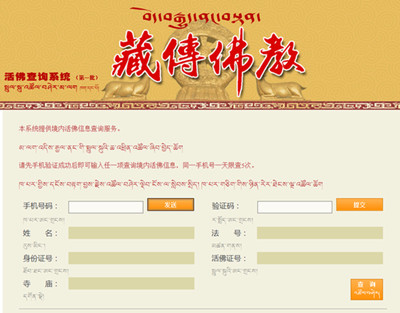This is NEWS Plus Special English.
China has created an online database of legitimate Living Buddhas to help followers of Tibetan Buddhism distinguish between the real ones and the fakes.
The database includes names, Dharma names, date of birth, and sects of the religion, as well as the Living Buddhas certificate numbers and photos.
The database currently has information on 870 Living Buddhas, and more will be added as the status of additional Living Buddhas is certified.
The database was created after an incident involving Wu Darong who sought to hold a Living Buddha enthronement ceremony for actor Zhang Tielin. Wu later issued an apology and resigned from his posts after a Tibetan Buddhist Monastery refused to certify Zhang as a Living Buddha.
The State Administration of Religious Affairs says the database should help reduce the ability of fake Buddhas to take advantage of people and operate in society.
The online data base is available at the websites of the Buddhist Association of China, the State Administration of Religious Affairs and news portal Tibet.cn.

This is NEWS Plus Special English.
International students will have more opportunities for internships, to take part-time jobs and even to start their own businesses in certain regions of Beijing.
Under a series of new policies released recently, starting on March 1, foreign students can be given short-term internships in Zhongguancun, a science and technology area in Beijing's Haidian district. International students studying at Beijing universities can take part-time jobs or become involved in entrepreneurship in the area.
The Ministry of Public Security says on its website that the new policies have been applauded by university teachers in charge of international student affairs and by others who help develop employment opportunities for students in China.
The teachers at universities have been concerned about their international students' opportunities for internships, jobs and entrepreneurship since 2013.
At that time, the ministry released a series of regulations raising employment thresholds for international students, whether through an internship or a regular job.
A survey of more than 300 South Korean students studying in China found that 90 percent of them wanted to stay in China, by landing a job or starting a business in the country after graduation.












